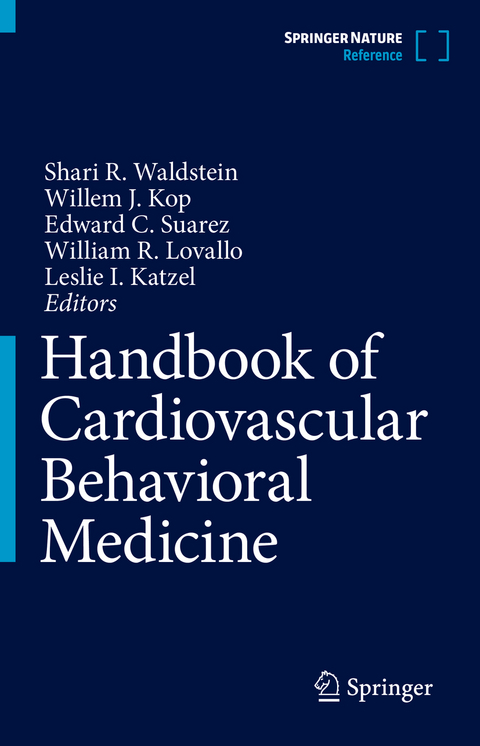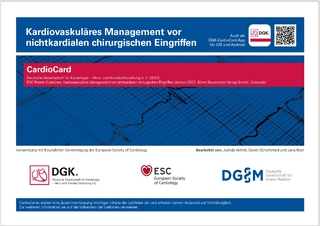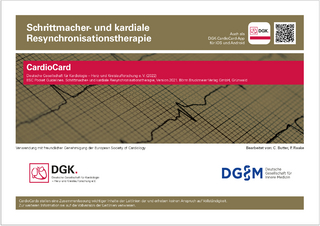
Handbook of Cardiovascular Behavioral Medicine
Springer-Verlag New York Inc.
978-0-387-87365-7 (ISBN)
- Titel wird leider nicht erscheinen
- Artikel merken
In 1989, Schneiderman and colleagues published a seminal work entitled "Research Methods in Cardiovascular Behavioral Medicine." Since that time, there has been an exponential increase in the amount and scope of work in this topic area, but no similar edited volume has been undertaken. The present handbook provides a compendium of work in the field of cardiovascular behavioral medicine, the purposes of which are to summarize research in this area, promote transdisciplinary research and clinical practice, and encourage researchers and clinicians to consider all relevant facets of the disease process in their evaluation and study of cardiovascular disease pathogenesis and outcomes.
This handbook has four sections: Section I provides perspectives on the past, present, and future of cardiovascular behavioral medicine, an overview of basic cardiovascular anatomy and physiology, cardiovascular disease classification, and application of the biopsychosocial model to the study of cardiovascular disease. Section IIcovers risk factors for cardiovascular disease from a behavioral medicine perspective, including sociodemographic, behavioral, psychosocial, biomedical, psychophysiological, and environmental risk factors for cardiovascular disease.These chapters offer a discussion of construct definitions, measurement issues, and epidemiological evidence for relations to cardiovascular disease. Section III offers review of multi-level influences in specific cardiovascular disease entities, the evidence- base for relevant biopsychosocial interventions, evaluation of the impact of cardiovascular diseases on behavior, and consideration of common co-morbidities. Section IV covers select statistical and bioethical topics relevant to the field of cardiovascular behavioral medicine.
This volume is unique in several respects. First, there is no similar work available in terms of the scope of topic coverage. Second, the inclusion of relevant measurement issues and construct definitions of a comprehensive set of risk factors will be of great assistance to researchers and clinicians in this area who wish to improve their assessment of these variables yet are not familiar with or trained in the various methodologies. Third, the use of multidisciplinary contributors enhances the utility of the work. Representative disciplines include psychology, psychiatry, medicine (e.g., cardiology), nursing, epidemiology, and public health. The primary audiences for this work are researchers, clinicians, and students in each of these disciplines.
Shari R. Waldstein, Ph.D. is Professor of Psychology, Behavioral Medicine Track Director, and Affiliate Professor of Gerontology at the University of Maryland, Baltimore County; Professor of Medicine in the Division of Gerontology, Geriatrics and Palliative Medicine at the University of Maryland School of Medicine; and Research Scientist for the Geriatric Research Education and Clinical Center at the Baltimore Veterans Affairs Medical Center. She completed her A.B. in Psychology at Duke University; received her M.S. and Ph.D. in Clinical Psychology, with specialty training in cardiovascular behavioral medicine, from the University of Pittsburgh; and completed clinical internship training in neuropsychologyat Brown University. Dr. Waldstein's interdisciplinary research examines (a) relations of cardiometabolic risk factors and diseases to neurocognitive function and subclinical brain pathology assessed by neuroimaging; (b) biopsychosocial correlates of cardiometabolic risk profiles; and (c) variation and disparities in these associations as a function of age, race, socioeconomic status, and sex/gender. She has been supported by multiple grants from the National Institutes of Health and other organizations for over 25 years. Dr. Waldstein currently serves on the Executive Council of the Academy of Behavioral Medicine Research (ABMR), and has previously served as President of the American Psychosomatic Society (APS), as a member of the APS Executive Council, and as Chair of the APS Professional Education Committee; as Member-at-Large for Division 38 (Society for Health Psychology) of the American Psychological Association (APA); and as Chair of the Education and Training Council for the Society of Behavioral Medicine (SBM). She is presently an Editorial Board member for the journal Psychosomatic Medicine, and previously served as an Associate Editor for Health Psychology and a regular member of the Mechanisms of Emotion and Stress in Health (MESH) study section for the National Institutes of Health. Dr. Waldstein is a Fellow of the ABMR, SBM, and Division 38 of the APA. She was the recipient of an Early Career Award from the APS, an Outstanding Scientific Contributions to Health Psychology Award from Division 38 of the APA, and an Outstanding Contributions to Science Award from the Maryland Psychological Association. Dr. Waldstein was the 2015-2016 Lipitz Professor of the Arts, Humanities, and Social Sciences at UMBC. Willem J. (Wijo) Kop, Ph.D. is Professor of Medical and Clinical Psychology at Tilburg University, the Netherlands. Dr. Kop received his Ph.D. from Maastricht University, the Netherlands in 1994, after which he took a position at the Uniformed Services University of the Health Sciences, Bethesda, Maryland, USA until 2006. He then took a position at the University of Maryland in the Division of Cardiology where he directed the Behavioral Cardiology Program. Dr. Kop investigates cardiovascular diseases and other disorders where fatigue, depression and mental stress interact with the autonomic nervous and immune systems. These studies involve psychological evaluations using Structured Clinical Interviews, ambulatory monitoring techniques, as well as controlled procedures to induce mental stress. The general scope of his research program is to identify the biological mechanisms by which psychological factors affect disease outcomes, and to what extent these relationships are mediated by health behaviors, such as physical activity. His current research integrates novel technological developments in ambulatory remote patient monitoring and e-Health with biobehavioral processes relevant to health and disease. Dr. Kop has been Principal Investigator on several studies funded by the National Institutes of Health. Dr. Kop is actively involved in the fields of Psychosomatic and Behavioral Medicine and Health Psychology. He is the current Editor-in-Chief of one of the leading journals in his field: Psychosomatic Medicine. Dr. Kop has also served on several editorial boards, including Health Psychology and Brain, Behavior and Immunity and was a member of various NIH review panels and other international scientific review boards. Dr. Kop is the recipient of the 1998 Early Career Award of the American Psychosomatic Society and the 2002 Outstanding Contributions to Health Psychology Award from the American Psychological Association. Edward C. Suarez, Ph.D., M.A. is Professor in the Department of Psychiatry and Behavioral Sciences at Duke University Medical Center and in the Department of Psychology and Neuroscience at Duke University in Durham, North Carolina. He received his A.B. in Mathematics and Psychology, and his Ph.D. in Psychology from the University of Miami, and a M.A. in Bioethics from Wake Forest University. The focus of his research has been exploring the relation of psychosocial factors, such as hostility, depression, and anger, to established and emerging early risk markers of atherosclerotic cardiovascular disease and Type 2 diabetes, and the moderating influences of gender and race as well as alcohol consumption, family history, socioeconomic status, and physical activity. The focus of his most current projects has been: (1) dysregulation of the feedback loop between the hypothalamic-pituitary-adrenal axis and the inflammatory response system, and how dysregulation relates to symptoms of depression and emotional stress responses in men and women, and (2) personalized health planning and mindfulness meditation as interventions for reducing the risk of Type 2 diabetes in prediabetic adults. His interest in metabolism has led him to expand his research to the relation of micronutrients to risk of depression and early markers of Type 2 diabetes and how race influences these associations. His work has been supported by the National Heart, Lung and Blood Institute from 1988 to 2014. He was the Guest Editor of a Special issue of Brain, Behavior and Immunity that focused on the influences of gender, race, and ethnicity on neuroimmune parameters. He has been on the Editorial Boards of numerous journals, a member of various Advisory Boards for the National Institutes of Health (NIH), and is a Fellow of the Society of Behavioral Medicine who awarded him their New Investigator Award in 1989. William R. Lovallo, Ph.D., is Regents Professor Emeritus of Psychiatry and Behavioral Sciences at the University of Oklahoma Health Sciences Center and a Senior Research Career Scientist and Director of the Behavioral Sciences Laboratories at the VA Medical Center in Oklahoma City. He obtained his A.B. in Psychology from UCLA, his M.A. in Experimental Psychology from the University of Colorado, Boulder, and his Ph.D. in Biological Psychology from the University of Oklahoma. His research concerns cardiovascular and neuroendocrine responses to psychological stress, and his most current project is devoted to understanding stress reactivity and emotion regulation in young adults with a family history of alcoholism. His work has been supported by the Department of Veterans Affairs, the National Institutes of Health, and the John D. and Catherine T. MacArthur Foundation. He has served as the Associate Director of the MacArthur Research Network on Mind-Body Interactions, and as a Council Member and President of the American Psychosomatic Society. He has been on the editorial boards of the International Journal of Psychophysiology, Psychosomatic Medicine, the International Journal of Behavioral Medicine, and the Annals of Behavioral Medicine, he has served on numerous NIH advisory groups, and he has been a Fellow of the American Psychological Association and the Society of Behavioral Medicine. His book, Stress & Health: Biological and Psychological Interactions is widely used in psychology, medicine, anthropology, and nursing programs. Leslie I. Katzel, M.D., Ph.D. is an Associate Professor of Medicine in the Division of Gerontology, Geriatrics and Palliative Medicine, Department of Medicine, University of Maryland School of Medicine and Director of the Baltimore Veterans Affairs Medical Center Geriatrics Research, Education, and Clinical Center (GRECC), and co-PI along with Drs. Jay Magaziner and Alice Ryan of the University of Maryland Claude D. Pepper Older Americans Independence Center (UM-OAIC). He obtained his B.S. in Physics from The Cooper Union for the Advancement of Science and Art, his PhD in Biophysics from the Johns Hopkins University, and his MD from the University of Maryland School of Medicine. He completed an internal medicine residency at the University of Maryland and fellowship training in geriatrics at Johns Hopkins with additional training as a medical staff fellow at the National Institute of Aging/Gerontology Research Center. Dr. Katzel is a board-certified internist and geriatrician. For the past 30 years he has been principal investigator or co-investigator on grants funded by the NIH and Department of Veteran Affairs that focus on the performance of exercise and lifestyle interventions in older adults with numerous medical comorbidities including metabolic syndrome, chronic kidney disease, Parkinson's Disease, peripheral arterial disease, HIV and stroke. The overall hypothesis of his work is that adverse changes in functional performance, cognition and metabolic profiles that occur with aging, obesity, sedentary lifestyle and disease can in part be reversed with weight loss and exercise interventions. He has also collaborated on several research studies with Dr. Waldstein and colleagues that examined the impact of aging, hypertension, chronic kidney disease, race, and socioeconomic status on neurocognitive function and neuroimaging outcomes. He has published more than140 journal articles and book chapters. Dr. Katzel also has a longstanding interest in research ethics. He is former chair and vice chair of the University of Maryland Institutional Review Board (IRB) and served as a site visitor and council member for the Association for the Accreditation of Human Research Protection Programs (AAHRPP). Dr. Katzel is chair of the VA Maryland Health Care System (VAMHCS) Research and Development Committee and chair of the University of Maryland Embryonic Stem Cell Oversight Committee (ESCRO).
Cardiovascular Behavioral Medicine: Past, Present, and Future.- Introduction to Cardiac Anatomy, Physiology, and Pathophysiology.- Classification of Cardiovascular Diseases: Epidemiology, Diagnosis and Treatment.- The Biopsychosocial Perspective on Cardiovascular Disease.- Childhood Factors in Adult Risk for Cardiovascular Disease.- Aging Changes in Cardiovascular Structure and Function .- Risk Factors for Ischemic Heart Disease in Women.- Stress and Heart Disease in Women: The Stockholm Women's Intervention Trial in Coronary Heart Disease Study.- From Race to Racism in the Study of Cardiovascular Disease: Concepts and Measures.- Socioeconomic Status and Cardiovascular Disease.- Health Disparities and Cardiovascular Diseases.- Nicotine Dependence and Cardiovascular Diseases: Biobehavioral and Psychosocial Correlates.- Alcohol and the Cardiovascular System: Implications for Behavioral Medicine.- Impact of Specific Diets and Nutritional Supplements on Cardiovascular Diseases.- Understanding Obesity and Cardiometabolic Risk.- Physical Activity/Exercise and Cardiovascular Disease.- Sleep as a Biobehavioral Risk Factor for Cardiovascular Disease.- Methodological Challenges in the Measurement of Medication Adherence in Patients with Cardiovascular Disease.- Personality Factors in Cardiovascular Disease: The Big Five and Type D Personality.- Hostility and Health.- Negative Emotions: Depression, Exhaustion, Anxiety.- Positive Psychological Well-Being and Cardiovascular Disease.- Stress and the Development of Atherosclerotic Cardiovascular Disease.- Work and Cardiovascular Diseases.- Social Support and Cardiovascular Disease: Racism, Ethnic Discrimination, and Cardiovascular Health: Conceptual and Measurement Issues.- Religion, Spirituality and Cardiovascular Disease.- Aggregation of Psychosocial Risk Factors: Models and Methods.- Contexts and Cardiovascular Health.- Environmental Toxicants and Cardiovascular Behavioral Medicine.- Genetics in Cardiovascular Behavioral Medicine.- Hypertension.- The Measurement of Lipids and Lipoproteins in Behavioral Medicine Research.- Insulin, Glucose, and the Metabolic Syndrome in Cardiovascular Behavioral Medicine.- Inflammation, Atherosclerosis, and Psychological Factors.- Hemostasis and Endothelial Function.- Catecholamines and Catecholamine Receptors in Cardiovascular Behavioral Medicine.- The Assessment of Autonomic Influences on the Heart Using Impedance Cardiography and Heart Rate Variability.- Hypothalamic-Pituitary-Adrenocortical Axis.- Ambulatory Monitoring and Ecological Momentary Assessment.- Cardiovascular Reactivity and Risk for Cardiovascular Disease.- Neuroimaging and the Study of Cardiovascular Stress Reactivity.- Asymmetric Innervation of the Heart.- Biopsychosocial Factors in Coronary Artery Disease.- Chest Pain: Cardiac and Non.- Mental Stress-Induced Myocardial Ischemia: Prevalence, Clinical Significance and Treatment Implications.- Acute Behavioral and Psychosocial Triggers of Myocardial Infarction.- Cardiac Arrythmias and Sudden Cardiac Death.- Behavioral Medicine Treatments for Heart Failure.- Stroke and Carotid Artery Disease.- Congenital Heart Disease.- Coronary Artery Bypass Grafting: Psychosocial Dimensions of a Surgical Procedure.- Heart Transplantation .- Measuring Behavioral Outcomes in Cardiac Rehabilitation.- The Psychological Treatment of Cardiac Patients.- Quality of Life and Subjective Health: Strengthening the Subjective Perspective in Cardiology.- Cardiovascular Disease and Cognitive Function.- Diabetes and Cardiovascular Disease.- HIV-1 Spectrum Disease, Psychological Distress and Cardiometabolic Disease.- Measurement of Change.- Causal Modeling: Confounding, Mediation, Moderation, and some General Considerations in Regression Modeling.- Systematic Reviews and Meta-Analysis in Behavioral Medicine.- Ethical Issues in Cardiovascular Behavioral Medicine Research.
| Erscheint lt. Verlag | 22.7.2022 |
|---|---|
| Reihe/Serie | Handbook of Cardiovascular Behavioral Medicine |
| Zusatzinfo | 10 Tables, color; 19 Illustrations, color; 46 Illustrations, black and white; XL, 2360 p. 65 illus., 19 illus. in color. Print + eReference. |
| Verlagsort | New York, NY |
| Sprache | englisch |
| Maße | 155 x 235 mm |
| Themenwelt | Geisteswissenschaften ► Psychologie ► Sozialpsychologie |
| Medizinische Fachgebiete ► Innere Medizin ► Kardiologie / Angiologie | |
| Medizin / Pharmazie ► Medizinische Fachgebiete ► Psychiatrie / Psychotherapie | |
| Studium ► Querschnittsbereiche ► Prävention / Gesundheitsförderung | |
| Schlagworte | Behavioral Medicine • Bypass • Cardiovascular • Cardiovascular Disease • Cardiovascular medicine • disease prevention • Hypertension • Interventions • risk factors |
| ISBN-10 | 0-387-87365-1 / 0387873651 |
| ISBN-13 | 978-0-387-87365-7 / 9780387873657 |
| Zustand | Neuware |
| Haben Sie eine Frage zum Produkt? |
aus dem Bereich


